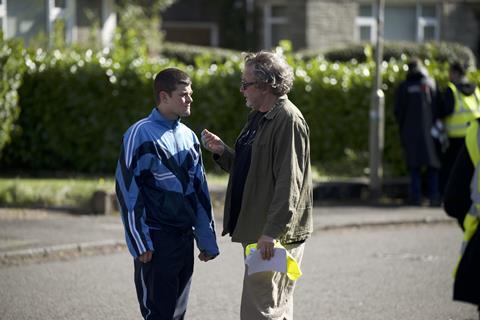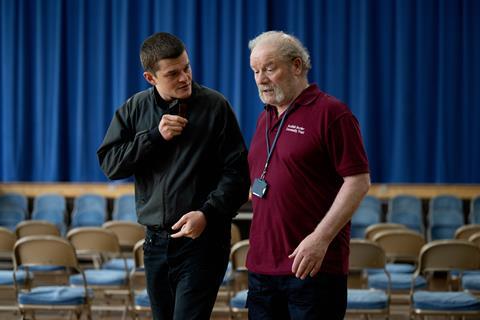The director and producer of I Swear reveal how they sidestepped development hell to bring their biopic of Tourette syndrome campaigner John Davidson to fruition in less than two years.

Expletives layered with homophobic and racist outbursts are not typically found in commercially minded feelgood films. But it was integral to I Swear, Kirk Jones’ biopic of Scottish Tourette syndrome campaigner John Davidson. “All I wanted to do was serve John’s story,” says Jones, with the film landing a UK certification of 15.
The seed of I Swear, which world premieres as part of TIFF’s Centrepiece programme, was first planted in 1989. Jones, who was not yet a filmmaker, saw BBC documentary John’s Not Mad, about Davidson’s life growing up with Tourette’s, a neurological condition that causes sudden, repetitive, involuntary sounds or movements. “I remember being moved and inspired by it and thinking, ‘That would make a good film,’” says Jones, who made his feature directing debut with comedy Waking Ned Devine in 1998.
He has gone on to helm four more films — Nanny McPhee, Everybody’s Fine starring Robert De Niro, What To Expect When You’re Expecting and My Big Fat Greek Wedding 2. But it was not until a couple of years ago that he sat down to ponder his next project and saw in an old notebook the words: “John Davidson, Tourette’s”.
He contacted Davidson through Facebook, who was suspicious initially, but Jones travelled from his home in Bristol to Scotland for a meeting, and the two got to know each other. Jones was already in touch with UK producer Piers Tempest of Tempo Productions, having almost worked together previously. “The only person I sent the script to was Piers, and he responded positively,” recalls Jones. “Then we were kind of up and running.”
For Tempest, it was an easy yes owing to his faith in Jones’ writing, as well as his own experience of two relatives with Tourette’s. There was a two-year period between Jones first meeting Davidson and the film wrapping its shoot. With development processes often dragging on for years, what was the secret behind such a swift turnaround?
“Involving as few people as possible,” laughs Jones. “If you have 10 people in the studio who are involved, if you have high financing and lots of financiers, everyone wants their input. Some people want a happy ending, some people don’t. You’re bombarded with all these notes and opinions and views. The joy of Piers and I working together was that it was just the two of us.”
“Going in,” adds Tempest, “we said to each other, to maximise complete creative control for Kirk and complete freedom on how we cast the film, what is the lowest number we can make it for? And then let’s find collaborators, heads of department, who will work for the love of it on a short shoot and give them all participations in the film [reduced wages, with upsides down the line in the film’s profits].”
They raised the money privately, with UK-based sales agent Bankside Films offsetting the risk with a raft of pre-sales including Studiocanal for the UK and Ireland. Public funding pillars BFI, BBC Film and Film4 were not considered the place to go for the project. “It’s not Kirk’s first film, it’s certainly not my first film,” says Tempest. “There are very specific remits for [UK] public funders now. There would be reams of notes, a lot of views. For this film, I trust Kirk completely and want to give him the ability to make what he wants.”
While Tempest will not reveal the exact budget, he confirms it was low and utilised the UK’s Independent Film Tax Credit, the nascent enhanced tax incentive for films with a production budget of less than £15m ($20.3m). The budget was kept tight thanks to the participation model, while music supervisor Kirsten Lane was able to negotiate down the costs of music rights thanks to the film’s message, with an impressive soundtrack including songs from New Order and Oasis.
The film shot on location for 30 days between July and September 2024 in Glasgow, doubling for Davidson’s home of Galashiels, which was deemed too expensive owing to the cost of relocating crew.
Care in casting

Jones was aware that ‘authentic casting’ is a hot topic. While many background characters were played by people who have Tourette’s, Robert Aramayo (The Lord Of The Rings: The Rings Of Power) was chosen to play the lead, with newcomer Scott Ellis Watson as the younger Davidson; neither actor has Tourette’s. Further cast includes Maxine Peake, Peter Mullan and Shirley Henderson.
“I was incredibly aware of that [authentic casting] right from the beginning,” says Jones. “I spoke to John Davidson about it, and I went to a fairly extreme length of thinking, ‘What if John took the role playing himself for the last 30 minutes?’”
Jones embarked on a “glorified screen test” with Davidson, which he funded himself. They shot four scenes across three days. “The three days were close to being a disaster,” recalls Jones, owing to Davidson’s struggles to suppress or play up his tics in line with the scene, and the unfair pressure it was putting on him.
“Some people will say, ‘Great, you tried really hard.’ Some people in 2025 will always find something [negative to say],” reflects Jones. “The only thing I would ask people to remember is when you look at Rob’s performance, it’s extraordinary, it’s incredibly funny, incredibly sad, it’s everything in between.”
Davidson was always on the end of the phone but did not spend much time on set. “My experience is that it can be disruptive — the crew is in awe. In particular for the lead actor, it can mess with their head,” says Jones.
The charity Tourette Scotland was a constant support throughout the production process, including in casting, and was in close contact with Aramayo, who spoke to dozens of people living with the condition in preparation for the role. “He was keen to fully understand the condition and not just do an impersonation of John,” says Jones.
Aramayo was also given the freedom to embellish the script with improvised tics. “When he spoke to people who had Tourette’s, he would often hear them tic, and would think, ‘I like that tic, that’s a good one.’ He would ask their permission if he could use it in the film.”
Increasing levels of audience and media scrutiny are being placed on stories rooted in truth. Richard Gadd’s Netflix series Baby Reindeer ran into legal issues for its claim of being a “true story”. Number 9 Films and Shadowplay Features, the UK producers of The Salt Path, were forced to release statements distancing the film from Raynor Winn, the author of the book on which it is based, over allegations parts of the memoir were fabricated, claims the author disputes as “highly misleading”.
Were there any fears for the filmmakers when taking on a true story? “It wasn’t something I thought about going into the project,” says Jones. “It’s a dramatisation of a true story, but having said that, almost every scene in the film is as John described it to me. I’m not saying it’s 100% absolutely accurate, but 98%.
“I was in the very unusual position of having the documentary footage of John throughout his life. It’s rare that a director can make a biopic and then realise that pretty much every four or five years, John’s life was documented on film.”
“If you omit something that is a significant part of the story, then I can see why it sometimes becomes problematic. But in this film, we just haven’t,” adds Tempest, whose producer credits for films based on true stories include Bank Of Dave, Military Wives and Churchill. He is currently in production on a fictional project, Rose’s Baby directed by Trudie Styler, produced alongside Styler and Celine Rattray’s Maven Screen Media.
Going ‘glocal’
Tempest and Jones are keen for I Swear to have commercial reach outside the UK. “It’s a terrible term, ‘glocal’,” says Tempest of their vision for the picture. “But if you have a film that has a strong sense of place and authenticity, I think they travel extremely well if they are commercial. People in communities in Arizona or Athens or Azerbaijan will relate to a good story and themes they recognise about John’s life.”
At the end of the film, there will be a listed resource for people to learn more about Tourette’s, adapted for different territories. Comfort screenings are a priority for people living with the syndrome to watch the film with ease. “That’s been discussed and is at the forefront of our minds,” confirms Tempest.
Davidson is unable to visit Toronto for the world premiere, owing to challenges around flying with his condition. However, he has seen the film, twice. “He absolutely loves it,” beams Jones. “He’s so proud.”















![[L-R]: Amanda Villavieja, Laia Casanovas, Yasmina Praderas](https://d1nslcd7m2225b.cloudfront.net/Pictures/274x183/6/4/1/1471641_pxl_20251224_103354743_618426_crop.jpg)








![[L-R]: Amanda Villavieja, Laia Casanovas, Yasmina Praderas](https://d1nslcd7m2225b.cloudfront.net/Pictures/100x67/6/4/1/1471641_pxl_20251224_103354743_618426_crop.jpg)
No comments yet